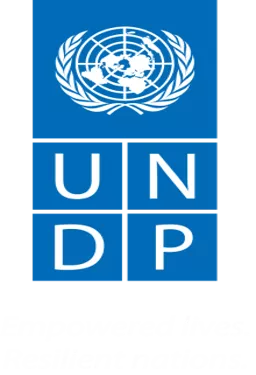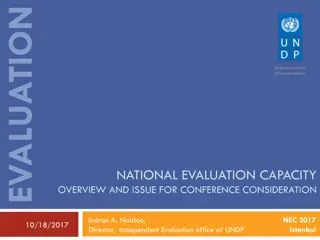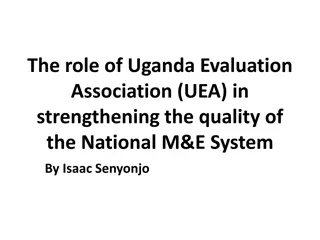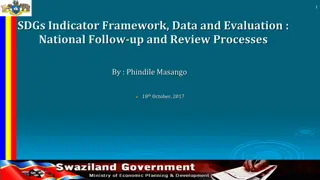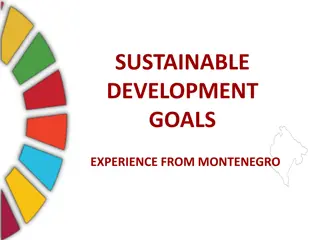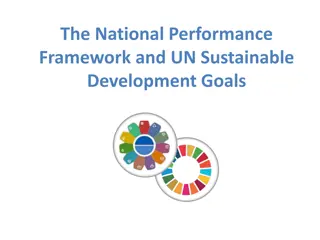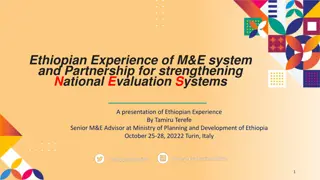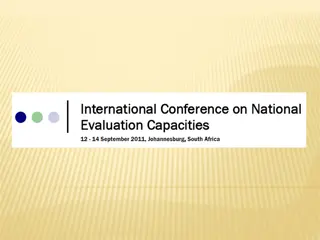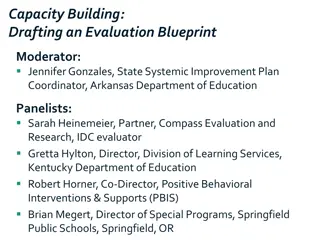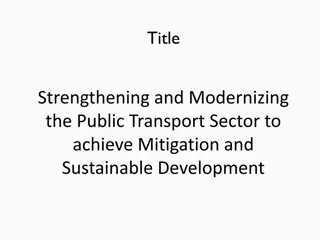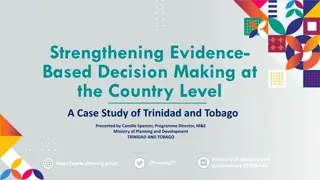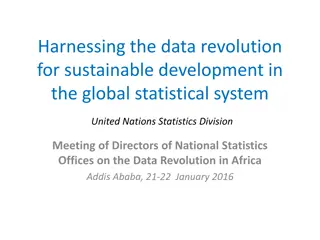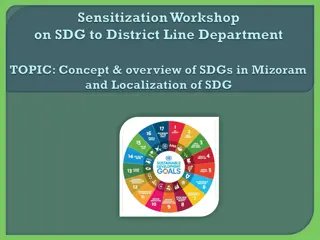Strengthening National Evaluation Capacity in the Era of Sustainable Development Goals
The presentation by Vijayalakshmi Vadivelu at the National Evaluation Capacities Conference 2017 in Istanbul focused on the importance of strengthening national evaluation capacity in alignment with the Sustainable Development Goals (SDGs). The content covers the holistic approach to national evaluations, integration into national systems, support for public policy, country-led evaluations, inclusivity, data-driven decision-making, and challenges faced in advancing evaluation capacities. It highlights the evolving nature of evaluation capacities and key factors slowing down progress in emergent and evolving contexts.
Download Presentation

Please find below an Image/Link to download the presentation.
The content on the website is provided AS IS for your information and personal use only. It may not be sold, licensed, or shared on other websites without obtaining consent from the author. Download presentation by click this link. If you encounter any issues during the download, it is possible that the publisher has removed the file from their server.
E N D
Presentation Transcript
EVALUATION NATIONAL EVALUATION DIAGNOSTICS GUIDANCE Session on Country-led evaluation in the era of the Sustainable Development Goals: Guidance note and on-line assessment tool , National Evaluation Capacities Conference 2017, Istanbul Vijayalakshmi Vadivelu, Evaluation Advisor, Independent Evaluation Office 18 October 2017
Presentation covers 1. What does strengthening national evaluation capacity mean in practice in the SDG era? 2. An overview of the National Evaluation Diagnostic Guidance Independent Evaluation Office 2
3 NATIONAL EVALUATION CAPACITY: WHAT DOES STRENGTHENING MEAN IN REALITY?
The Agenda 2030 emphasizes the need for an holistic approach to national evaluations Evaluation integrated into national systems Support public policy Country-led Inclusive & participatory Integrated view of institutions & development Focus on the poorest, most vulnerable Independent Evaluation Office Data driven
Evaluation capacity is evolving but not at an require pace Mature Evaluation Capacity Mainstream evaluation across government institutions Evolving Evaluation Capacity Well established systems and processes Evaluate key national priorities and programmes Emergent Evaluation Capacity Generate evidence on key indicators Better / more sophisticated information systems to help with complexity of policies and decisions Evaluation use is demonstrated for good governance Systems and processes are being established Create enabling environment for consultation and critical review of performance Co-lead evaluations financed by external stakeholders Generate basic evidence Champion evaluation in global fora and by supporting peers Independent Evaluation Office 5
Multiple factors are slowing national evaluation progress in emergent and evolving capacity contexts Evaluation capacity challenges Constraints in the use of evaluations Data and analysis gaps Independent Evaluation Office 6
7 NATIONAL EVALUATION DIAGNOSTIC GUIDANCE
National evaluation diagnostic guidance aims to facilitate institutional self-assessment Enables unpack evaluation requirements Outlines a series of steps to assess key evaluation bottlenecks and needs Non-prescriptive approach to account for institutional/and other development context differences For use by government entities primarily and other evaluation actors who will support government Flexible to use by the federal government, regional/state government as well as at local levels Independent Evaluation Office 8
The Guidance recognizes the complexity of national evaluations Complex set of coordination of actors and actions that interact in repeated, evolving, and sometimes unpredictable ways Evaluation developed with an output-oriented linear approach capacities cannot be Evaluation system needs to be integrated with existing institutional and societal practices and values, and evolve with them Independent Evaluation Office 9
Guidance will facilitate diagnostics of enabling environment and organizational capacity environment Enabling Broad policy system Organizational capacities Institutional structures and policies Independent Evaluation Office 10
Diagnostics modules address key areas of national evaluation capacities Independent Evaluation Office 11
Module 1: Understanding and building enabling environment for national evaluation systems Identify paths that would facilitate and accelerate national evaluation capacities Collaborate with constituencies with comparable objectives Map Build Assess the need for evaluation stakeholders' interests constituencies and partnerships Independent Evaluation Office 12
Module 2: Assessing the value-added of evaluation to the national and local SDGs planning Promoting the 2030 Agenda nationally National systems and Agenda 2030 linkages Supporting SDG mainstreaming in decentralized institutions Mapping national priorities against SDGs Integrating SDGs into national and sectoral plans Assigning coordination responsibility Independent Evaluation Office 13
Module 3: Instruments for diagnosing existing evaluation capacities Planning and building ownership of the diagnostic process Conduct of diagnostics Leveraging the process for capacity- development, awareness- raising, and information- sharing Reporting findings Follow up on the diagnostics Independent Evaluation Office 14
Module 4: Institutionalizing & strengthening national and local evaluation capacities Strengthen data and statistics Adopt evaluation policy Establish evaluation entity Address evaluation capacity gaps Strengthen coordination of inter-sectoral evaluations Enable diversification of the decentralized evaluations Independent Evaluation Office
Module 5: Integrating the SDGs specificities into evaluation practices Clarify new expectations and to ensure the integration of new evaluation approaches, questions, and values into evaluation plans, terms of reference, and methodologies Independent Evaluation Office 16
The guidance and the online tool will be made available by April 2018 Pilot the guidance in 6 counties Revise the Guidance and the online tool Rollout in 6 counties 01 02 03 04 05 Independent Evaluation Office 17
Thank you ! 18 Vijayalakshmi Vadivelu Evaluation Advisor Independent Evaluation Office, UNDP 220 E 42nd St 20th floor New York, NY 10017 vijaya.vadivelu@undp.org www.undp.org/evaluation twitter-little.png Facebook.ico /IEOUNDP /UNDP Evaluation /EvaluationOffice
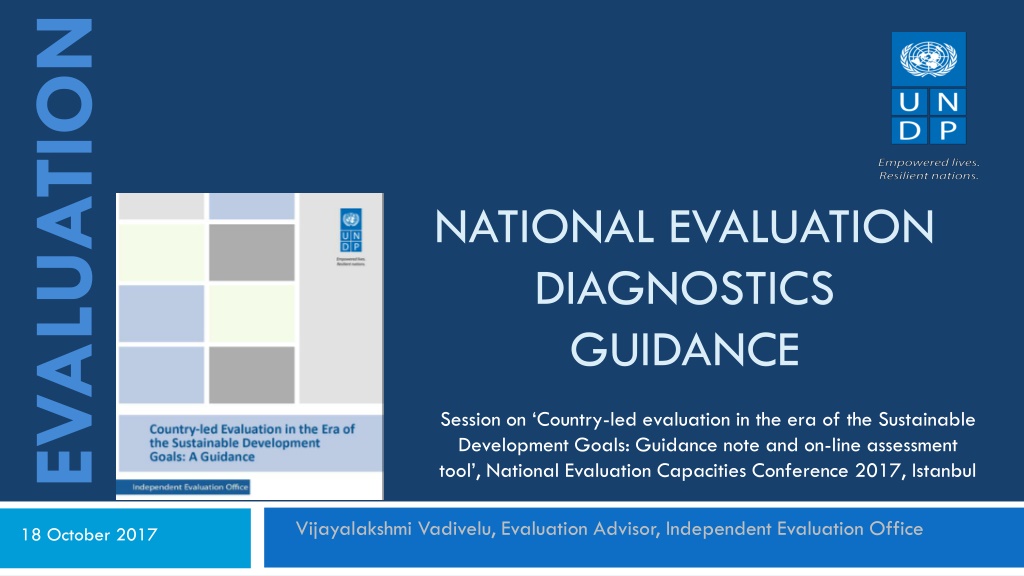
 undefined
undefined


